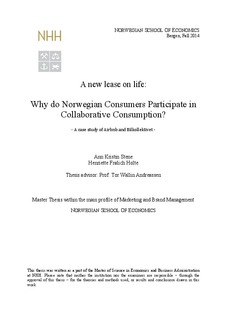A new lease on life : Why do Norwegian Consumers Participate in Collaborative Consumption? A case study of Airbnb and Bilkollektivet
Master thesis
Permanent lenke
http://hdl.handle.net/11250/276161Utgivelsesdato
2014Metadata
Vis full innførselSamlinger
- Master Thesis [4372]
Sammendrag
Norwegians have started to show an increased interest in the new socio-economic
groundswell – collaborative consumption. The new economic model is characterized by
components such as peer-to-peer transactions, utilization of idle capacity and access over
ownership.
The objective of this master thesis has been to gain knowledge of why Norwegians choose to
participate in collaborative consumption. We have conducted a case study of Airbnb and
Bilkollektivet. The study has been carried out by focus groups interviews with 17 current
users of these platforms. The broad range of factors identified during the interviews was
coded and reduced into different categories. We identified five categories: financial,
convenience, experiential, social and symbolic.
The main reasons why people choose to participate in collaborative consumption are often
described as a mean to do good. However, their intentions may not be entirely pure, as
participation offers users possible financial benefits as well. Our findings indicate that the
motive for participation was predominantly financial. It seems like the Norwegians have
bypassed the initial idealistic phase and right into the more “business like” phase of
collaborative consumption. In addition, the users also found participation appealing, as the
services are convenient to use and offers them perceived control in every step of the process.
Through collaborative consumption the power is shifting to the consumers, where they can
start deciding which products and services that matters.
